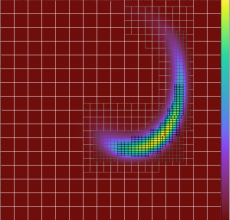SENSEI Showcased at SC18
Software Infrastructure Sets the Stage for Exascale In Situ Analysis and Visualization
November 7, 2018
By Margie Wylie
Contact: cscomms@lbl.gov

This in situ rendering of the AMReX advection mini-app running on NERSC’s Cori system was enabled by SENSEI Python support that will be presented by CRD staff at SC18. The Python based analysis code uses Yt, a popular AMR-aware rendering suite written exclusively in Python.
CRD scientists at SC18 are showcasing SENSEI, a lightweight software infrastructure that enables simulations to make use of a wide array of popular in situ analysis and visualization packages.
A Berkeley Lab-led four-year multi-lab private-public research partnership, SENSEI will be featured in a tutorial, demonstrations (DOE Booth 2433), and research paper presented at ISAV 2018 during the conference.
In situ, or “in place” data analysis and visualization will be critical to the success of exascale simulations. Like the runaway chocolate factory from an iconic “I Love Lucy” episode, exascale computers are set to churn out data faster than I/O bandwidth can move that data off-chip to be stored and analyzed. By analyzing the raw data output by simulations right where that data is produced, or in situ, scientists are able to preserve more time steps to produce more accurate models. (The alternative is discarding some data, like Lucy and Ethel jamming the overwhelming flow of chocolates into their mouths.)
SENSEI decouples simulation codes from the specifics of any particular analysis or visualization package. Codes calling on SENSEI’s interface can switch out or combine the capabilities of multiple in situ packages.
The framework already supports a wide variety of software packages. And at SC18, CRD staff working on SENSEI, including Burlen Loring, Wes Bethel and Gunther Weber, will present a paper describing recently added support for the popular Python programming language.
About Berkeley Lab
Founded in 1931 on the belief that the biggest scientific challenges are best addressed by teams, Lawrence Berkeley National Laboratory and its scientists have been recognized with 16 Nobel Prizes. Today, Berkeley Lab researchers develop sustainable energy and environmental solutions, create useful new materials, advance the frontiers of computing, and probe the mysteries of life, matter, and the universe. Scientists from around the world rely on the Lab’s facilities for their own discovery science. Berkeley Lab is a multiprogram national laboratory, managed by the University of California for the U.S. Department of Energy’s Office of Science.
DOE’s Office of Science is the single largest supporter of basic research in the physical sciences in the United States, and is working to address some of the most pressing challenges of our time. For more information, please visit energy.gov/science.









